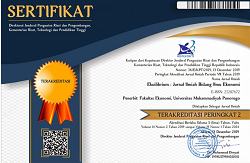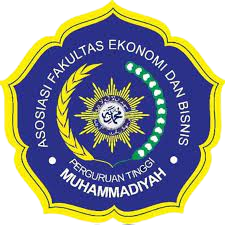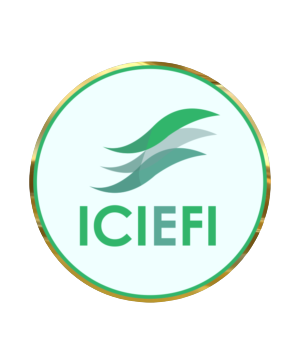Editorial Policies
Focus and Scope
The aim of this journal publication is to disseminate the conceptual thoughts or ideas and research results that have been achieved in the area of business and economic
Ekuilibrium : Jurnal Ilmiah Bidang Ilmu Ekonomi, particularly focuses on the main problems in the development of the sciences of business and economic areas as follows:
A. Development Economics;
- Econometrics,
- International Economics,
- Environmental Economics,
- Public Economics,
- Monetary Economics,
- Macroeconomics,
- Microeconomics,
- Human Resource Economics,
- Capital Market,
- History of Economic Thought,
B. Accountancy;
- Public Sector Accounting,
- Information System Audit,
- Taxation,
- Business and Profession Ethics,
- Cost Accounting and Management Accounting,
- System and Information Technology,
Human Resource Management,
- Consumer behavior,
- Marketing Management,
- Business management,
- Financial management,
- Information Management and Innovation,
- Entrepreneurship
Section Policies
Artikel
 Open Submissions
Open Submissions Indexed
Indexed Peer Reviewed
Peer Reviewed
Peer Review Process
Ekuilibrium: Jurnal Ilmiah Bidang Ilmu Ekonomi uses an online submission and review system. The submission and peer review of every article must be managed using this system and based on following Peer Review Policy.
- Ekuilibrium: Jurnal Ilmiah Bidang Ilmu Ekonomi Editorial Board is responsible for the selection of papers and the selection of reviewers.
- Articles must typically be reviewed by at least two independent reviewers.
- Reviewers are unaware of the identity of the authors, and authors are also unaware of the identity of reviewers (double blind review)
- Reviewing process will consider novelty, objectivity, method, scientific impact, conclusion, and references.
- The final decision of manuscript acceptance shall be made by the Editorial Board according to reviewers critical comments.
- Section Editor will send the final decision regarding the submission to the corresponding author based on the reviewer’s recommendation.
- Ekuilibrium: Jurnal Ilmiah Bidang Ilmu Ekonomi Editorial Board shall protect the confidentiality of all material submitted to the journal and all communications with reviewers.
Open Access Policy
This journal provides immediate open access to its content on the principle that making research freely available to the public supports a greater global exchange of knowledge.
Archiving
Ekuilibrium: Jurnal Ilmiah Bidang Ilmu Ekonomi intend and expect to continue to publish our journal for a very long time. If, due to some rare, unfortunate circumstances, we are forced to stop publishing the journal, the manuscripts published in the journal will be kept online and accessible to the readers for at least 10 more years. When required under specific conditions, such as discontinuation of the collection or catastrophic failure of the website, the content will be accessible through LOCKSS and CLOCKSS.
The LOCKSS (Lots of Copies Keep Stuff Safe) system to ensure a secure and permanent archive for journal content, and the CLOCKSS (Controlled Lots of Copies Keep Stuff Safe) system to ensure a secure and permanent archive for the journal.
Complete archiving policy can be found here:
https://journal.umpo.ac.id/index.php/ekuilibrium/pages/view/achiving_preservation
Ekuilibrium: Jurnal Ilmiah Bidang Ilmu Ekonomi Archiving and Preservation Policy covers:
- Digital Archieve
- Local Archive
- Website Archiving
- Self-archiving
- Indexing
- If journal stops publishing
- In the Event of Notice of Possible Litigation
Abstracting & Indexing
Ekuilibrium: Jurnal Ilmiah Bidang Ilmu Ekonomi, has been covered by these following indexing services.
1. Google Scholar [2010] (https://scholar.google.co.id/)
2. Directory of Open Access Journal (DOAJ) [2017] (http://www.doaj.org)
3. CrossRef [] (http://www.crossref.org)
4. Sinta: Science and Technology Index Peringkat 2 [2019] (https://sinta.kemdikbud.go.id/journals/)
5. Dimensions
6. Garba Rujukan Digital (GARUDA)
Update : August, 2022.
Peer Review Policy
Peer Review Guideline
Before you accept or decline an invitation to review, consider the following questions:
- Does the article match your area of expertise? Only accept if you feel you can provide a high quality review.
- Do you have a potential conflict of interest? Disclose this to the editor when you respond.
- Do you have time? Reviewing can be a lot of work – before you commit, make sure you can meet the deadline.
Respond to the invitation as soon as you can – delay in your decision slows down the review process, whether you agree to review or not. If you decline the invitation, provide suggestions for alternative reviewers.
Review Comment
Your review will help the editor decide whether or not to publish the article. Giving your overall opinion and general observations of the article is essential. Your comments should be courteous and constructive, and should not include any personal remarks or personal details including your name.
Providing insight into any deficiencies is important. You should explain and support your judgement so that both editors and authors are able to fully understand the reasoning behind your comments. You should indicate whether your comments are your own opinion or are reflected by the data.
Reviewer Checklist
- Give your main impressions of the article, including whether it is novel and interesting, whether it has a sufficient impact and adds to the knowledge base.
- Give specific comments and suggestions, including about layout and format, title, abstract, introduction, method, statistical errors, results, conclusion/discussion, language and references.
- If you suspect plagiarism, fraud or have other ethical concerns, raise your suspicions with the editor, providing as much detail as possible. Visit the COPE guidelines for more information.
- According to COPE guidelines, reviewers must treat any manuscripts they are asked to review as confidential documents. Since peer review is confidential, they must not share the review or information about the review with anyone without the agreement of the editors and authors involved. This applies both during and after the publication process.
- Any suggestion that the author includes citations to reviewers’ (or their associates’) work must be for genuine scientific reasons and not with the intention of increasing reviewers’ citation counts or enhancing the visibility of reviewers’ work (or that of their associates).
The Final Decision
Ekuilibrium: Jurnal Ilmiah Bidang Ilmu Ekonomi Editor ultimately decides whether to accept or reject the article. The editor will weigh all views and may call for a third opinion or ask the author for a revised paper before making a decision.













